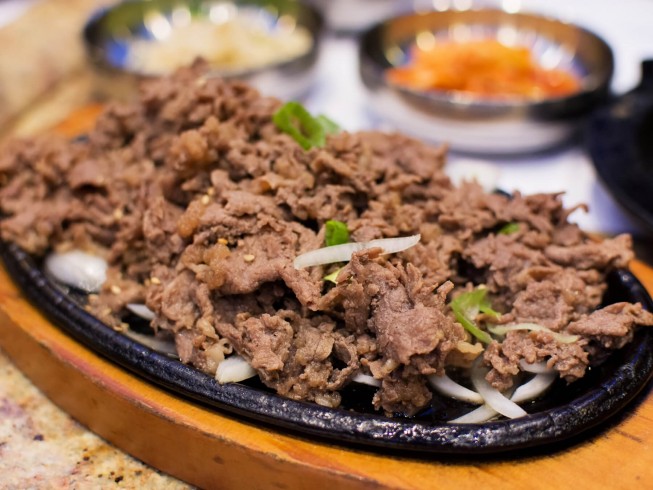Keeping a can of frozen orange juice concentrate in the freezer means you can make more than just orange juice. Try it in a variety of orange-flavored recipes.

Using cola as a beef bulgogi marinade isn't as odd as it sounds. Ginger, soy sauce, and sesame oil along with the soda pop make a sensational sweet and tangy marinade.

3 green onions
2 cloves garlic
1 white onion
1 piece (3-inch size) ginger
1 cup soy sauce
2 tablespoons sesame seeds
3 tablespoons sesame oil
1/4 cup sugar or corn syrup
1/2 cup coca-cola
3 pounds beef, such as flank steak, sliced thinly
Chop the green onions, both white and green parts. Crush the garlic. Peel and coarsely chop the white onion.
Peel the ginger and crush it with the flat side of a knife. Place the ingredients in a non-reactive container such as a zip-top plastic bag or glass bowl.
Add the soy sauce, sesame seeds, sugar or corn syrup, and coca-cola to the container. Mix well.
Add the thinly sliced beef to the marinade and gently mix to coat the meat in the marinade. Cover the container (or seal the bag) and marinate the meat in the refrigerator for a minimum of one hour or up to 24 hours.
When ready to cook, heat the grill or griddle to medium-high heat.
Remove the beef from the marinade and place it on the grill or griddle. Cook the beef for 1-2 minutes per side, turning as needed.
Serve the coca-cola marinated bulgogi with steamed rice.
Make sure the beef is sliced thinly against the grain to keep it tender.
If using a grill, make sure to fully preheat it to get a good sear on the beef.
Use brown sugar instead of white sugar for a deeper caramel flavor.
Try garnishes like fresh cilantro, chopped peanuts, or a sprinkle of sesame seeds.
For a spicier version, add a splash of gochujang or some crushed red pepper flakes to the marinade.
Bulgogi is a Korean dish that consists of marinated beef which is grilled or stir-fried. The marinade typically includes ingredients like soy sauce, sugar, sesame oil, garlic, and various spices.
Coca-Cola adds sweetness and acidity to the marinade, boosting the flavor of the beef and helping to tenderize it.
Yes, other types of soda like Dr. Pepper or root beer can also work if you want to experiment with different flavors, but they will alter the overall taste of the dish.
Flank steak, sirloin, or ribeye are popular cuts for bulgogi. These cuts are tender and marbled, making them ideal for quick cooking methods.
For best flavor and tenderness, marinate the beef for at least one hour but up to 24 hours for a deeper flavor. Do not marinate for more than 24 hours or the meat will start to break down and become mushy.
You can substitute the beef for chicken, pork, or tofu. Adjust the marinating time according to the protein used (chicken can be marinated for 2-4 hours, while pork can be marinated for up to 12 hours). Also adjust the cooking time as needed.
Bulgogi is traditionally served with steamed rice, but you can also pair it with lettuce leaves for wrapping, pickled vegetables, or side dishes like kimchi.
Store leftover bulgogi in an airtight container in the refrigerator for up to 3-4 days. Be sure to allow it to cool before storing.
Yes, bulgogi can be frozen. Store it in a freezer-safe bag or container for up to 2-3 months. Thaw in the refrigerator before reheating.
Reheat bulgogi in a skillet over medium heat until heated through, or microwave in short intervals, covered to keep it from drying out.
You can prepare the marinade a day in advance and store it in the refrigerator.
Chef's Knife: For chopping the green onions, crushing the garlic, coarsely chopping the white onion, and peeling as well as crushing the ginger.
Cutting Board: To chop and prepare the vegetables and ginger.
Measuring Cups and Spoons: For measuring the soy sauce, sesame seeds, sesame oil, sugar or corn syrup, and coca-cola.
Non-Reactive Container: Either a zip-top plastic bag or a glass bowl to combine the marinade and beef. This container should be non-reactive to prevent chemical reactions.
Grill or Griddle: For cooking the marinated beef.
Spatula or Tongs: For flipping the beef on the grill or griddle.
Steamed Rice: Serve the bulgogi over a bed of fluffy steamed rice. It creates the perfect neutral base to balance the intense flavors of the beef.
Kimchi: This fermented Korean vegetable dish adds a spicy, tangy kick that contrasts beautifully with the sweetness of the bulgogi. This kaktugi kimchi uses daikon radish instead of cabbage.
Lettuce Wraps: Use fresh lettuce leaves to wrap the bulgogi, accompanied by a sprinkle of sesame seeds and a drizzle of soy sauce.
Spicy Gochujang Sauce: A dollop of gochujang, a Korean red chili paste, brings heat that plays off the sweetness of the bulgogi.
Grilled Vegetables: Zucchini, bell peppers, and mushrooms, tossed lightly with sesame oil and grilled, can complement the bulgogi with their smoky sweetness while adding color to the plate.
Rice Noodles: Tossing bulgogi with rice noodles results in a delicious stir-fried dish, perfect for a quick meal. The noodles soak up the marinade, making every bite flavorful.
Egg Fried Rice: For a unique spin, mix leftover bulgogi with egg fried rice.
Sesame Oil Drizzle: A light drizzle of toasted sesame oil over the finished bulgogi brings out the nutty aroma, enhancing the dish without overpowering it.
Wine Pairings
Shiraz: This red has a spicy kick and fruity notes like blackberry that will beautifully complement the sweet and savory flavors of the bulgogi marinade. Look for one that has some peppery undertones to match the ginger's zip.
Zinfandel: Another fruity red that leans spicy, a bold Zinfandel can definitely hold its own against the richness of the beef and the sweetness of the cola. Go for one with jammy flavors to match with the marinade.
Gewurztraminer: If you're feeling adventurous with whites, a dry Gewurztraminer offers a floral and slightly spicy profile that plays nicely with the complex flavors of ginger and garlic in the dish. Keep an eye out for one with a touch of sweetness to balance the savory elements.
Other Alcohol Pairings
Soju: A smooth soju will enhance the flavors of the bulgogi without overwhelming it. Try a flavored one, like peach or lychee, for a fun twist.
Pale Ale: A crisp pale ale will bring a refreshing balance to the tangy marinade. Look for one with citrusy notes that can cut through the sweetness.
Red Sangria: Who doesn't love a good pitcher of sangria? With the right fruit and a splash of citrus, it adds a lovely refreshing feel that will pair well with the sweet-savory combo of the bulgogi.
Non-Alcoholic Pairings
Iced Green Tea: This is a refreshing choice that brings a subtle earthiness to the table. A glass of iced green tea can balance the richness while complementing the soy and sesame flavors.
Carrot Juice: Before you wrinkle your nose, think about how wonderfully sweet and earthy carrot juice can be. It'll add a nice contrast to the savory flavors in the bulgogi.
Tangerine Sparkler: A tangerine-flavored sparkling drink will bring a zesty finish to the sweet marinade. The bubbles and citrus will lift the dish without getting too serious about things.
Keeping a can of frozen orange juice concentrate in the freezer means you can make more than just orange juice. Try it in a variety of orange-flavored recipes.
Delicious recipes for red velvet cakes, cupcakes, and cheesecakes.
The name, vodka, comes from the Russian phrase zhiznennaia voda, or "water of life". It can be made from everything from potatoes to beets. It's considered to be fairly flavorless which makes it a great liquor for mixed drinks.



Online since 1995, CDKitchen has grown into a large collection of delicious recipes created by home cooks and professional chefs from around the world. We are all about tasty treats, good eats, and fun food. Join our community of 200K+ members - browse for a recipe, submit your own, add a review, or upload a recipe photo.

reviews & comments